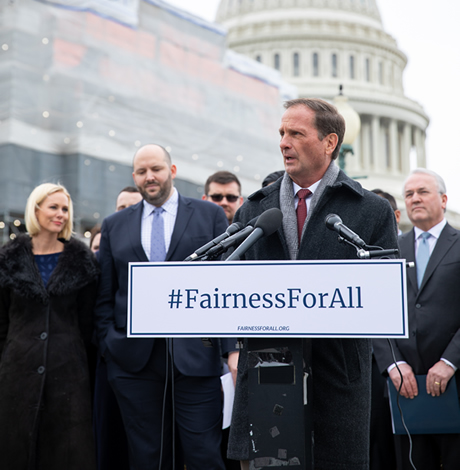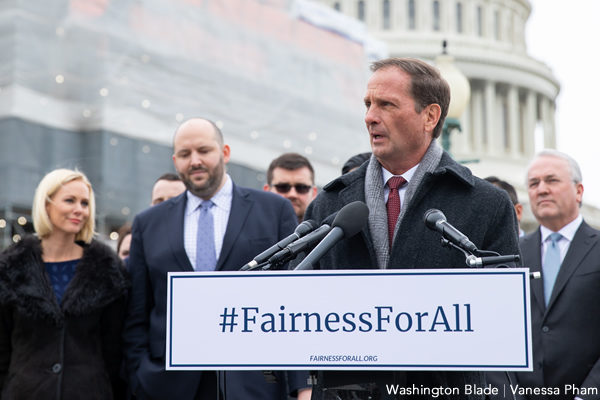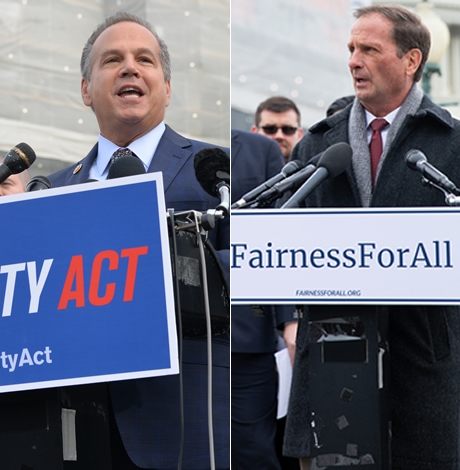News
Zero Democrats lend name to GOP compromise on LGBTQ rights
All 21 original co-sponsors are Republicans


Despite signals the Fairness for All Act counterproposal from Republicans on LGBTQ rights and religious freedom would have bipartisan support upon its reintroduction on Friday, the final list of original co-sponsors has no Democrats.
Although the list of 21 co-sponsors is more than double the nine who support the first iteration of the Fairness for All in the previous Congress, they’re entirely made up of Republicans. The absence of any Democrats dashes hopes from supporters the legislation could be a starting point for negotiations across the aisle on the Equality Act in the Senate.
Rep. Chris Stewart (R-Utah), the chief sponsor of the bill, nonetheless hailed the Fairness for All Act upon reintroduction as a way to bring the gap on LGBTQ rights and religious freedom.
“It is hard to really love our neighbors when we are fighting with them over whose rights are more important,” Stewart said. “This country can accommodate both civil liberties for LGBT individuals & religious freedom. We have wasted enough time, energy, and money fighting over who deserves which legal protections. It is time to define the federal protections for our LGBT and religious friends and neighbors.”
The Fairness for All Act, like the Equality Act, would amend all aspects of federal civil rights law to expand the prohibition on discrimination against LGBTQ people in employment, housing, public accommodations, federally funded programs, education, credit and jury service. A copy of the bill reviewed.by Blade revealed the Fairness for All Act doesn’t have substantive changes from its previous iteration in terms of LGBTQ issues, but other than clarity for protections based on race, color and national origin.
Stewart, in a statement to the Washington Blade, said he won’t give up on finding Democratic for the legislation.
“I am grateful to my colleagues who joined me today,” Stewart said. “We are still working with our Democratic colleagues and have high hopes that this bill will ultimately be bipartisan.”
Stewart had signaled as of Wednesday via a spokesperson the Fairness for All Act “will have bipartisan support by the end of the week” and would hold off on plans to introduce the legislation until after the U.S. House voted on the Equality Act, the flagship comprehensive bill to expand anti-discrimination principles for LGBTQ people under federal civil rights law.
The House approved the Equality Act on a largely party-line vote Thursday with just a blemish of bipartisan support. Three Republicans voted for the Equality Act, compared to the eight who voted for the legislation in 2019.
Rep. David Cicilline (D-R.I.), the sponsor of the Equality Act in the House, told the Washington Blade on Thursday amid uncertainty of the legislation in the Senate the Fairness for All Act would “very clearly be worse than nothing.”
“For the first time in our history, it would actually put in federal statute provisions that permit discrimination against the LGBTQ community,” Cicilline said, “It would be a tremendous step backward, which is why it’s not supported by any major LGBT organization, all of the major LGBT organizations support the Equality Act. The Stewart bill is a tremendous step backward in our fight for full equality.”
Asked if he has any issues with fellow Democrats co-sponsor the Fairness for All Act, Cicilline held firm.
“I would hope that people are committed to equality for the LGBTQ community would not support this bill because it would put in statute and authorize expressly discrimination against the LGBTQ community,” Cicilline said.
Among the co-sponsors are Republicans who voted for the Equality Act, including Reps. Brian Fitzpatrick (R-Pa.) and Tom Reed (R-N.Y.). Other co-sponsors are Republicans who voted for the Equality Act in 2019, but not 2021, including Rep. Elise Stefanik (R-N.Y.) and Mario Diaz-Balart (R-Fla.). One Republican who voted twice for the Equality Act, Rep. John Katko (R-N.Y.), isn’t a co-sponsors of the Fairness for All Act.
Although both the Equality Act and the Fairness for All Act would expand the prohibition on anti-LGBTQ discrimination under federal law, they have key differences. For example, the Equality Act would specify the 1993 Religious Freedom Restoration Act couldn’t be raised as a defense in court against allegations of illegal anti-LGBTQ discrimination, but the Fairness for All Act would not.
Additionally, the Fairness for All Act would provide an exemption under Title II of the Civil Rights Act to allow stores, shopping centers or online retailers to refuse service to LGBTQ people if they have 15 or fewer employees, but the Equality Act provides no such exemption. The Equality Act would clarify transgender people should have access to locker rooms and bathrooms consistent with their gender identity, while the Fairness for All Act implies that but doesn’t spell it out. The Equality Act is silent on whether its ban on sex discrimination would prohibit medical providers from refusing to perform an abortion, the Fairness for All Act specifies it would not.
(The Washington Blade is preparing a detailed chart on the differences between the Equality Act and the Fairness for All Act, as well as the situation with current law after the U.S. Supreme Court’s decision last year in Bostock v. Clayton County, which found anti-LGBTQ discrimination is an illegal form of sex discrimination under Title VII of the Civil Rights Act of 1964, therefore not only illegal in employment, but under all laws that ban sex discrimination.)
District of Columbia
Gay ANC member announces candidacy for Ward 1 D.C. Council seat
Community leader Brian Footer seeking seat held by Brianne Nadeau

Gay Advisory Neighborhood Commissioner Brian Footer, a community activist who has been involved for many years in local and national government affairs, has announced his candidacy for the Ward 1 D.C. Council seat up for election in 2026.
Footer, a Democrat, will be running in the city’s June 2, 2026, Democratic primary for the Ward 1 Council seat, but it is uncertain whether he will be running against incumbent Ward 1 Council member Brianne Nadeau (D). Nadeau has not yet announced if she plans to run for re-election for a fourth term following her 12 years on the Council.
Nadeau has been a longtime vocal supporter of the LGBTQ community.
If Footer were to win the primary and the November 2026 general election, he would become the Council’s second openly gay member. Ward 5 Council member Zachary Parker (D) is currently the 13-member Council’s only gay member.
Footer is a three-term ANC commissioner who currently serves as Chair of ANC 1E, which represents the city’s Adams Morgan neighborhood.
“Brian has worked at every level of government — federal, state, and local — building a career rooted in public service, aging policy, and inclusive urban planning,” a statement on his campaign website says.
“I’m running for Council because too many people in Ward 1 are doing everything right and still feel ignored by the city they call home,” Footer states on his website.
“I’m running because we can do better,” his statement continues. “That means making housing more affordable, addressing homelessness with real solutions, and keeping our neighborhoods safe with smart, community focused strategies.”
When contacted by the Washington Blade for comment, Nadeau said she was not ready at this time to discuss her plans about running again or about Footer’s candidacy.
“The primary is a ways away, and I’m very focused right now on the budget and the stadium deal and all the work that we’re doing at the Council,” she told the Blade. “So, I really haven’t had time to turn to my plans. So, as a result, I’m also not going to be commenting on anybody else who is determined that they’re running at this time.”
She first won election to the Council in 2014 after she defeated four-term gay Ward 1 Council member Jim Graham in the Democratic primary after Graham became embroiled in an ethics controversy.
In the 2022 Democratic primary Nadeau defeated gay challenger Salah Czapary in a three-candidate race, by a margin of 48.5% of the vote compared to Czapary’s 30.9%.
With the third candidate, Sabel Harris, receiving 20.4%, the outcome showed that the two challengers had a combined total vote count higher than Nadeau.
Further details of Footer’s candidacy can be accessed from his campaign website, brianfooterdc.com.
Spain
Spanish women detail abuses suffered in Franco-era institutions
Barcelona-based photographer Luca Gaetano Pira created ‘Las Descarriadas’ exhibit

A Barcelona-based photographer, audiovisual artist, and activist has created an exhibit that profiles Spanish women who suffered abuse in institutions that Gen. Francisco Franco’s dictatorship established.
Luca Gaetano Pira, who is originally from Italy, spoke with women who the regime, which governed Spain from 1936-1975, sent to Women’s Protection Board institutions.
The regime in 1941 created the board the country’s Justice Ministry oversaw.
Franco named his wife, Carmen Polo, as the board’s honorary president. Then-Prime Minister Felipe González fully dissolved the board in 1985, a decade after Franco’s death.
Gaetano’s exhibit is called “Las Descarriadas” or “The Misguided Women” in English.
“These are women who were detained between 1941 and 1985 for reasons that are unthinkable today: being lesbian, poor, pregnant out of wedlock, rebellious, politically active … or simply considered ‘morally suspect,'” Gaetano noted to the Washington Blade.
Groups affiliated with the Spanish Catholic Church ran these institutions. Gaetano pointed out they were “presented as social assistance centers.”
“In reality, they were spaces of punishment and forced reeducation, where isolation, unpaid work, and psychological violence were the norm,” he said. “Many of the survivors are still alive. Their testimonies are powerful, urgent, and of extraordinary current relevance.”
The regime sent more than 40,000 women to Women’s Protection Board institutions.
“Despite its seemingly benevolent name, it was in fact one of the most powerful instruments of moral and social control over women during and after the dictatorship,” notes the exhibit. “Under the guise of care and re-education, this institution functioned as a repressive apparatus that punished women who deviated from the ideal feminine model imposed by Franco’s regime: submissive, obedient, married, and dedicated to motherhood within the Catholic family structure.”
The Spanish Catholic Church last month issued a public apology, but Gaetano described it as “very soft” and noted “the women did not accept it.” Gaetano also compared the Women’s Protection Board institutions to Ireland’s Magdalene Laundries.
The Associated Press notes tens of thousands of “fallen” women were sent to the laundries that Catholic nuns operated in Ireland from the 18th century until the mid-1990s. Then-Irish Prime Minister Edna Kenny in 2013 issued a formal apology for the abuses that women suffered in the laundries and announced the government would compensate them.
The Spanish government has yet to offer compensation to the women abused in Women’s Protection Board institutions.
“My work focuses on recovering the historical memory of marginalized communities, particularly through the portrayal of survivors of institutional violence and the use of archival materials,” Gaetano told the Blade, noting he has also sought to highlight the repression that LGBTQ people suffered during dictatorships in Portugal and Latin America.
Gaetano’s exhibit can be found here:
District of Columbia
Gay GOP group hosts Ernst, 3 House members — all of whom oppose Equality Act
Log Cabin, congressional guest speakers mum on June 25 event

U.S. Sen. Joni Ernst (R-Iowa) and three women Republican members of the U.S. House appeared as guest speakers at the June 25 meeting of Log Cabin Republicans of D.C., the local chapter of the national LGBTQ Republican group with that same name.
The U.S. House members who joined Ernst as guest speakers at the Log Cabin meeting were Celeste Maloy (R-Utah), Kat Cammack (R-Fla.), and Julia Letlow (R-La.).
Neither D.C. Log Cabin Republicans President Andrew Minik nor spokespersons for Ernst or the three congresswomen immediately responded to a request by the Washington Blade for comment on the GOP lawmakers’ appearance at an LGBTQ GOP group’s meeting.
“Please join us for an inspiring evening as we celebrate and recognize the bold leadership and accomplishments of Republican women in Congress,” a D.C Log Cabin announcement sent to its members states.
“This month’s meeting will highlight the efforts of the Republican Women’s Caucus and explore key issues such as the Protection of Women and Girls In Sports Act and the broader fight to preserve women’s spaces in society,” the message says.
It was referring to legislation pending in Congress calling for banning transgender women from participating in women’s sports events.
According to media reports, Ernst and the three congresswomen have expressed opposition to the Equality Act, the longstanding bill pending in Congress calling for prohibiting discrimination based on sexual orientation and gender identity in the areas of employment, housing, and public accommodations.
The Log Cabin announcement says the meeting was scheduled to take place at the Royal Sands Social Club, which is a restaurant and bar at 26 N St., S.E. in the city’s Navy Yard area.
D.C. Log Cabin member Stuart West, who attended the meeting, confirmed that Ernst and the three congresswomen showed up and spoke at the event.
“It was a good turnout,” he said. “I would definitely say probably 30 or 40 people attended.” West added, “Four women came to talk to a group of mostly gay men. That’s something you don’t see very often.”
-

 Federal Government2 days ago
Federal Government2 days agoTreasury Department has a gay secretary but LGBTQ staff are under siege
-

 Virginia3 days ago
Virginia3 days agoDefying trends, new LGBTQ center opens in rural Winchester, Va.
-

 District of Columbia2 days ago
District of Columbia2 days agoGay GOP group hosts Ernst, 3 House members — all of whom oppose Equality Act
-

 Opinions4 days ago
Opinions4 days agoUSAID’s demise: America’s global betrayal of trust with LGBTQ people








